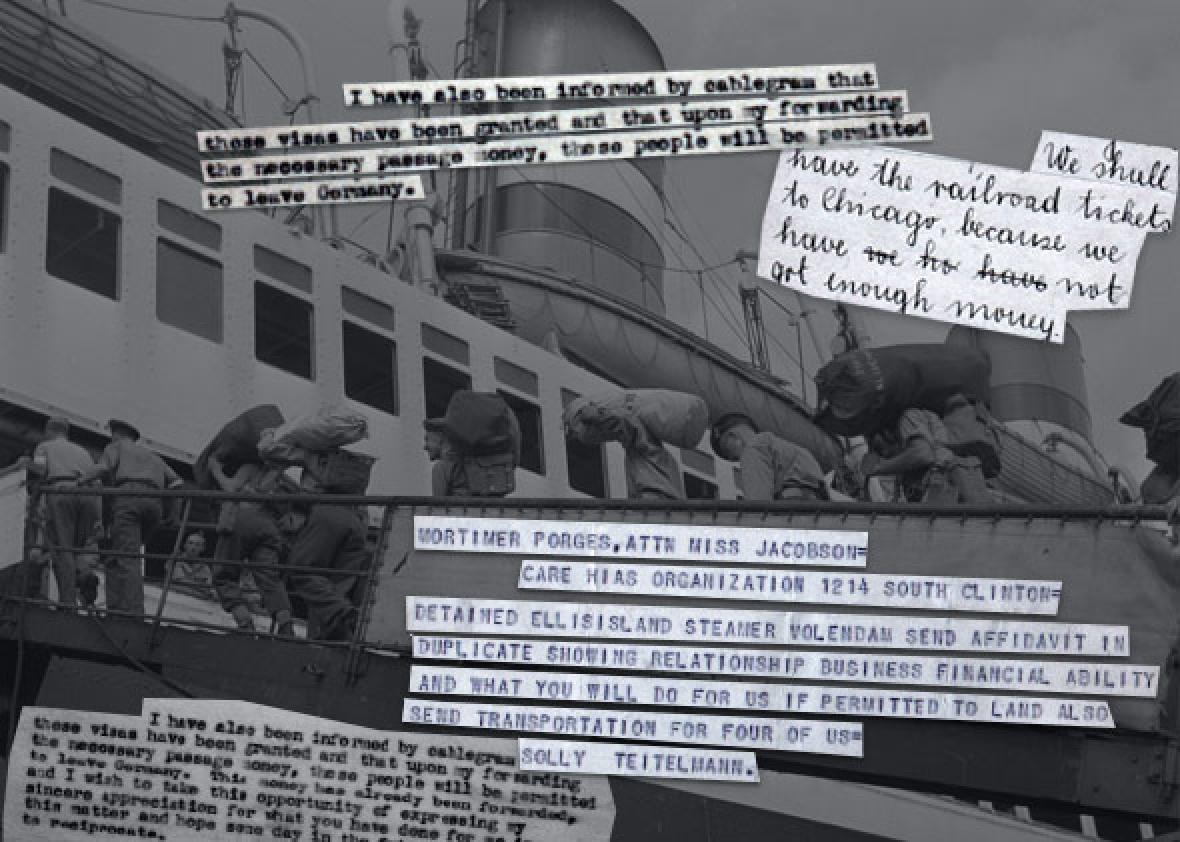This piece appears in slightly different form in the Financial Times.
Going through my mother’s papers after she died last year, I found a folder marked “1940 immigration—Jewish relatives.” The pleading letters and desperate cables it contained told a story I knew only in broad outline, about how my grandparents helped a family of distant relations escape the Nazis at the last possible moment.
After Kristallnacht in 1938, those relatives—Sol and Fruma Teitelmann, and their two young daughters Hanna and Mali—were desperate to “leave Germany in any way possible as quickly as possible,” as they wrote to my grandparents. As Lithuanian nationals stranded in Frankfurt, their only hope was to obtain one of the limited number of U.S. immigrant visas. My grandfather, Mortimer Porges, wrote a stack of letters to anyone he thought might be able to help: congressional aides, the State Department, and the Hebrew Immigrant Aid Society. He filled out forms and affidavits promising to provide for the Teitelmanns in Chicago.
Grandfather Mortimer quickly hit a Catch-22. Without a visa, the Teitelmanns couldn’t book passage; without boat tickets, they couldn’t obtain visas. “At all events, we do not want to lose hope, for it would be impossible to live here any longer in our situation without hope,” the Teitelmanns wrote to my grandparents in February 1939. But judging by the file, my grandfather was a persistent fellow. In February 1940, the Teitelmanns at last secured a visa under a Lithuanians quota. My grandparents turned to their extended family to raise $890 for third-class passage on the S.S. Volendam. It would be the ship’s final voyage from Rotterdam before the Nazis occupied Holland.
Those letters were the first thing I thought of Friday, when President Trump issued his executive order banning refugees from seven Middle Eastern countries for 120 days, and visitors of all kinds from those countries for 90 days. Here again was the heartlessness and bureaucratic caprice that doomed so many European Jews: the refugees pulled out of their seats on planes; the division of families caught on opposite sides of the border; even the 17-hour detention in handcuffs of an Army translator who risked his life working with U.S. troops in Iraq.
Here, too, was the undisguised religious bigotry. Trump’s order fulfilled a pledge he made during the campaign for a “total and complete shutdown of Muslims entering the United States.” Trump no longer calls his policy a Muslim ban, but his supporters understand it as such, and he has been asserting his preference for Christian immigrants (so long as not Mexican). Reporting by CNN has revealed that the order’s most vicious provision—a ban on re-entry by green-card holders who are permanent legal residents—came at the insistence of Trump’s white-nationalist adviser Stephen Bannon and over the legal guidance of the Department of Homeland Security.
For American Jews, the scenes of refugees detained in transit hold a particular resonance. We know that most of us exist today only because our ancestors, like the Teitelmanns, finagled their way into a country where they weren’t entirely welcome. That experience explains why several Syrian refugees trying to clear immigration before the deadline were being met by groups from synagogues that were sponsoring their resettlement. Jews witnessing the exodus from Aleppo or ISIS’s atrocities against the Yazidis can’t but see ourselves in parallel.
Trump’s deafness to these echoes is staggering. His executive order capped a week that began with his declaring a position of “America First” in his inaugural address. He either doesn’t know or doesn’t care that was the slogan of America’s pro-Nazi isolationist movement, which accused Jews of drawing the country into war. Trump issued his refugee ban on International Holocaust Remembrance Day, which he observed with a statement that failed to mention Jews or anti-Semitism. “Everyone suffered in the Holocaust, including obviously the Jewish people,” Trump’s pusillanimous chief of staff said on Face the Nation on Sunday in defense of the statement.
And so it is a Jewish-flavored reaction that may finally break down the wall of silence and fear around Trump’s vicious policies. “My great grandparents came from Germany, Austria and Poland,” Mark Zuckerberg wrote on his Facebook wall on Friday night. “Priscilla’s parents were refugees from China and Vietnam. The United States is a nation of immigrants, and we should be proud of that. … We should also keep our doors open to refugees and those who need help.” On Saturday, Sergey Brin, the Google co-founder who comes from a family of Soviet refuseniks, was photographed at a protest at San Francisco International Airport, one of many that occurred spontaneously across the country.
The last document in my grandparents’ folder is a letter dated September 1946. “Dear Mr. and Mrs. Porges,” it begins, “Enclosed you find the check for the amount of $286.00. We are happy today to be able to return this sum with our deep gratitude for the unforgettable deed you rendered us at the time of great need.” Another such time is upon us now.
